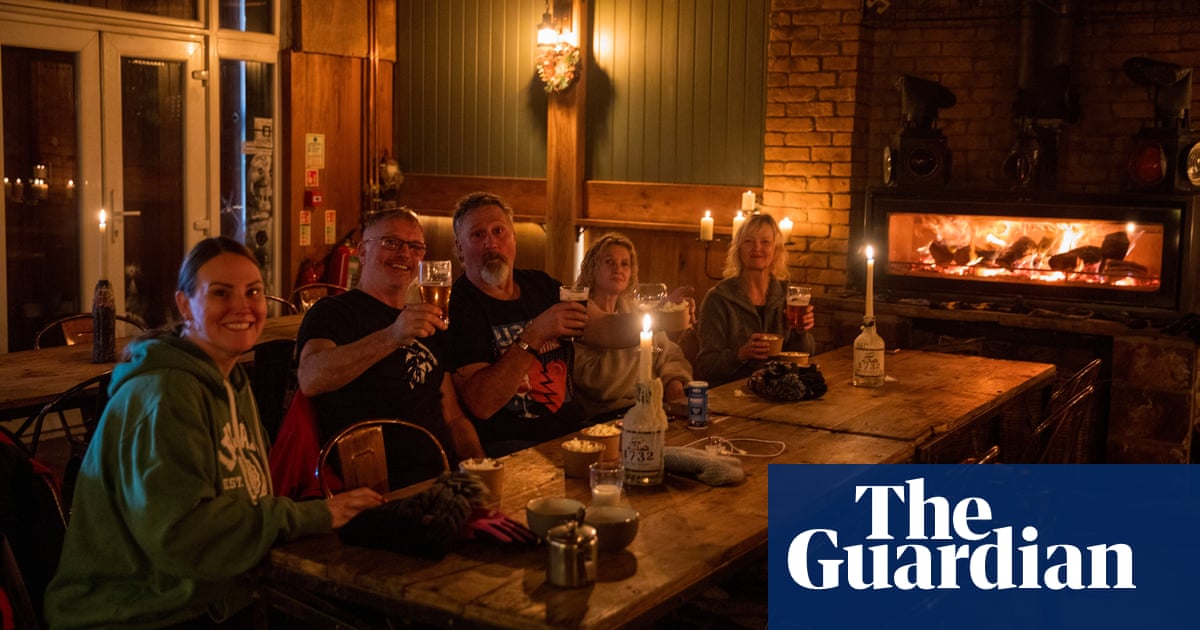Two Shell, a buzzy London duo who make hyperactive yet melancholy bass music, are well known for giving people the runaround. They keep themselves anonymous, and perform with scarves and sunglasses hiding their faces. Fans are sent on digital breadcrumb trails via mysterious websites and social media posts. Their first interview, with the Face, was conducted in a chatroom of their own design, and scrubbed from the internet shortly after publication. Their second, with Mixmag, was done over email and paired with photos of a duo who fans on Reddit are almost certain are not actually Two Shell.
So I am excited and wary when I arrive at their Deptford studio to talk with them about their self-titled debut album, released last week on the big-budget indie label Young. Two Shell’s music mashes together various kinds of dance music from the past few decades – speed garage, techno, hyperpop, house, dubstep – and runs it all through a cartoon filter, making for a sound that’s fast and dizzyingly heightened. Their studio is crammed with abstract paintings and pieces of outlandish raver gear. Two tables are covered with dozens of hats, each embellished with embroidery and scraps of fabric. Two young women are sitting on a fuzzy green couch, wearing outfits that sit somewhere between avant garde clubber and first-year art student: they introduce themselves as Flat Earther and Ghost Shrimp.
“So, this is the interview,” I say. Ghost Shrimp cheerily replies: “OK!” I realise I haven’t phrased it right. “So, this is the interview?” The women respond, with a huge amount of pep: “Yes!”
As well as their previous interview antics, the duo supposedly sent decoys to perform at their debut Boiler Room DJ set, and once performed four shows simultaneously at four different venues across London – though fans had worked out which show the “real” Two Shell would be at. They’ve played high-profile sets at Coachella and Glastonbury, presumably as themselves – although again, who knows?
I ask Two Shell about their origins. They first became friends, Earther says, after Shrimp broke both her ankles, and the former had to wheel the latter around to their university lectures on an old office chair. They each speak with the blissed-out, slightly befuddled cadence of someone who’s just taken a gigantic hit on a gravity bong, and punctuate each other’s sentences with drawn out “yeeeeeahs”. They oscillate between generic, boilerplate statements about their work (“We’re really interested in collaboration, yeah?”) and genuinely engaging yarns.
They weren’t born, for example: they popped out of a patch of Astroturf between Brixton and Loughborough Junction, and shortly afterwards performed their first ever set at a purgatory-like bus stop nearby, which they couldn’t leave until they became really great DJs. They compare themselves to vape flavours: Earther is more like Sadboy Blue while Shrimp feels aligned with Ego Death. Vape is important to Two Shell; it had a “ghostly presence”, along with a Lime scooter and a selfie stick, the day they “reverse slipped” out of that Astroturf.

You see where this is going: the two women I spend a painful 45 minutes chatting to are almost definitely not Two Shell. I know this because if the duo really wanted to be anonymous, they could have done a much better job; less than five minutes of Googling will net you a Companies House listing tying the address of their Deptford studio to Womb Ltd, formerly Two Shell Ltd, whose directors, Patrick Edwards Lewis, 33, and Jack Riou Benson, 35, are also credited writers on a bunch of Two Shell songs on various songwriting databases. (Fans on Reddit, obviously, have known this information for a long time.) Lewis and Benson, childhood friends raised in south London, have been making dance music for quite a few years under various names, including Jynx and Player 2, although none of it has the brilliant alien thrill of the music they make as Two Shell.
The decoy duo give me a mysterious-looking USB covered in grey putty, but when I plug it in it’s been corrupted. I initially assume this is yet another layer to the bit, but I have in fact become victim to my newfound Two Shell truther mentality: “It was not meant to be corrupt but not sure what was meant to be on there,” their manager texts me later.
Two Shell’s publicist didn’t realise they had sent decoys, and when I run into him a couple of nights later, he says, with slight exasperation, that he really thought the duo were using this interview as an opportunity to give the jokes a rest for a second and just talk about their music. He then tells me that “Two Shell is actually 25 people” – alluding to the large network required to maintain things like shell.tech, the ever-changing password-protected site through which they release new music – before conceding that, yes, the music part likely is just two guys.
After their album is released, it becomes clear that some advance versions sent out to the press to review were totally different from the finished thing; two editors at Pitchfork each received their own versions, and those versions were different to the one sent to the writer assigned to review the album.
Two Shell have been releasing music for a good five years now – including a collaboration with FKA twigs, and a twisted rework of Sugababes’ Round Round endorsed by the group – and I am increasingly of the opinion that the prankster side of the duo might have played better during their post-pandemic breakout years, when the games and tricks heightened the anticipation and thrill of finally going out again. I head to the duo’s long-running ShellTek night at London’s Ormside Projects the day after my interview, courtesy of a token presented alongside my dud USB that would grant me entry every week, and am surprised to see that this release-week event is sparsely attended. A guy in the smokers’ area tells me that “ShellTek is always empty” before catching himself: “It’s meant to be empty – it’s a place for people to play their craziest, weirdest music.”
You could charitably say that Two Shell’s pranks are a satire on rampant self-promotion in the age of social media, although they do present a conundrum: is a labyrinthine system of trick mirrors and trapdoors the absence of marketing, or lots and lots of it? Two Shell, the album, is a sadder, less sugary affair than previous releases – and emphatic confirmation that the music has and likely always will be the most engaging, exciting part of the project.
Shrimp suggested to me that maybe the two things have to be linked: “We love pranks, but we don’t think they make it any less sincere,” she said. “When something’s funny, you can actually tell the truth, get to another level. It’s almost the most sincere.”

.png) 2 months ago
19
2 months ago
19













































